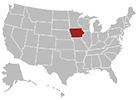
Either you already work in a healthcare setting, or you want to and have an interest in dentistry.
If so, becoming a dental assistant may be the right career for you.
Page Navigation
- Requirements to Become a Dental Assistant In Iowa
- Iowa Dental Assistant Schools
- Salary
- Frequently Asked Questions
- How long does it take to become a Dental Assistant in Iowa?
- What classes do I need to take to become a dental assistant in Iowa?
- Where do dental assistants work?
- What skills should an Iowa dental assistant have?
- What challenges do experienced Iowa Dental Assistants face?
- What other careers can an Iowa dental assistant pursue?
Requirements to Become a Dental Assistant In Iowa
To become a National Entry Level Dental Assistant (NELDA) in Iowa, you need to enroll yourself in a training program recognized by the Commission on Dental Accreditation (Coda).
In addition, you must pass a certification exam.
To enter a DA training program, whether it be at the entry-level or pursuing an advanced certificate, you must be at least 17.
You also need to have your high school diploma, GED, or equivalent certificate of completion before you enroll in a post-secondary course.
Exceptions do apply if you decided to participate in a high school work-study program that prepares you for a career after you graduate.
When starting out, you will perform work as a Dental Assistant Trainee.
Before you continue your training, however, you must apply for a certificate of registration via the Iowa Dental Board.
Additional considerations apply to become an Expanded Functions Dental Assistant (EFDA), a position where you would be allowed more authority than an entry-level assistant but still require supervision.
Iowa Dental Assistant Schools
1. Des Moines Area Community College

Coda has accredited the DMACC Dental Assistant Diploma program that prepares students to become part of a reputable dental health team.
The program includes an introduction to general and specialty dentistry, dental chair patient preparation, radiology, and laboratory and business office assisting.
Clinical experience is also provided at several facilities.
2. Hawkeye Community College

The Dental Assisting program at Hawkeye will teach you dental and oral anatomy and related medical terms.
It also shows you how to perform digital dental radiography readings (X-rays).
In addition, your training will develop your skills in computerized charting and record-keeping, and you will become aware of the criticalness of infection control.
You will receive 320 hours of real-world work experience by the time you finish this certificate program.
After that, you’ll become ready to take the DANB exams.
This coursework has received recognition from the Commission on Dental Accreditation.
3. Indian Hills Community College

The Indian Hills Community College Dental Assisting curriculum includes learning about the way the mouth, teeth, and gums work.
In addition, you will receive demonstrations about dental materials, sterilization, taking X-rays, and more.
You also will participate in clinical experiences, which provide you with hands-on training in a real-world dental office setting.
This schooling takes 12 months, and this DA coursework is accredited by the Commission on Dental Accreditation, which is the gold standard for dental programs.
4. Iowa Western Community College

The Dental Assistant Diploma Program at Iowa Western Community College in Iowa is a ten-month program that prepares students for a career in dental assisting.
Duties of dental assistants include dental instrument sterilization and tool tray setup and completing office tasks.
Just so you know, not all Dental Assistants work in a dental office.
Some of them might seek employment at dental schools, hospitals, public and private employers, and local health departments.
This IWCC program is accredited by CODA.
You will have the opportunity to gain experience in private dental practices, specialty dental practices, and dental colleges, while still enrolled.
5. Kirkwood Community College
![]()
Dental Assisting students at Kirkwood Community Collège in Iowa about teeth and mouth anatomy, restorative materials, and techniques.
Equipment sterilization, radiology processing, reading, and chairside dental patient assisting also are a part of this curriculum.
Students in the program would also learn how to take and develop dental x-rays, as well as how to process dental laboratory requests.
While enrolled in this one-year program at Kirkwood, you will experience first hands what it is like to work with patients under the supervision of a dentist and other certified staff.
After you finish your diploma courses, you can take additional courses toward becoming an EFDA.
Then, you can pursue an associate’s degree.
After about two years, you will have one-third of the training required to become a licensed dentist.
Dental Assistant Schools in Iowa – Summary Table
Top 5 Schools in Iowa
| School Name | Address |
|---|---|
| Des Moines Area Community College | 1100 7th St, Des Moines, IA 50314 |
| Hawkeye Community College | 1501 E Orange Rd, Waterloo, IA 50701 |
| Indian Hills Community College | 525 Grandview Ave, Ottumwa, IA 52501 |
| Iowa Western Community College | 2700 College Rd, Council Bluffs, IA 51503 |
| Kirkwood Community College | 6301 Kirkwood Blvd SW, Cedar Rapids, IA 52404 |
Salary
Annual Salary Range:Average Salary of Dental Assistants in Iowa
| City Name | Salary |
|---|---|
| Des Moines | $39,410 |
| Cedar Rapids | $36,711 |
| Davenport | $38,838 |
| Sioux City | $34,733 |
| Waterloo | $37,026 |
| Iowa City | $38,401 |
| Council Bluffs | $38,583 |
| Dubuque | $38,412 |
| Ames | $39,043 |
| West Des Moines | $39,410 |
Regional Salary in Iowa
| Region | Employed | Avg. Annual Salary | Avg. Hourly Pay | Top 10% Annual Salary | Bottom 10% Annual Salary |
|---|---|---|---|---|---|
| Ames, IA | 100 | $47,470 | $22.82 | $57,710 | $38,360 |
| Cedar Rapids, IA | 360 | $51,090 | $24.56 | $59,080 | $39,000 |
| Davenport-Moline-Rock Island, IA-IL | 430 | $45,590 | $21.92 | $58,300 | $35,470 |
| Des Moines-West Des Moines, IA | 720 | $52,410 | $25.2 | $60,790 | $43,680 |
| Dubuque, IA | 160 | $48,920 | $23.52 | $58,120 | $39,020 |
| Iowa City, IA | 260 | $51,740 | $24.88 | $59,440 | $39,640 |
| Sioux City, IA-NE-SD | 190 | $48,570 | $23.35 | $58,870 | $38,930 |
| Waterloo-Cedar Falls, IA | 180 | $48,500 | $23.32 | $57,830 | $38,290 |
* Employment conditions in your area may vary.
Frequently Asked Questions
How long does it take to become a Dental Assistant in Iowa?
Dental Assistant certificate training in Iowa typically takes 9-12 months to complete.
During this time, you will receive paid on-the-job training while being supervised by a dentist and other certified Dental Assistant staff.
What classes do I need to take to become a dental assistant in Iowa?
Some Iowa required DA courses include oral anatomy, dental materials, radiography, infection control, and chairside assisting.
You will also need to understand the importance of HIPAA guidelines and patient privacy.
Medical ethics also come into play when training to become a dental assistant, so some of your classes cover that.
Where do dental assistants work?
Dental assistants in Iowa include work at certified dental offices, clinics, and hospitals.
You might also find the experience at non-profit urgent care centers.
What skills should an Iowa dental assistant have?
They need to have organizational skills, and they must pay attention to detail when updating patient records.
In addition, DAs need to remain calm, especially when helping patients get ready for routine cleanings, surgeries, fillings, extractions, and other treatments.
What challenges do experienced Iowa Dental Assistants face?
If you want to become a dental assistant, you also need to be ready to work under pressure.
Some days, you will have an influx of patients—more than you think you can handle.
There is no room for error when tracking a patient’s dental health history, and you always have to prepare yourself for dealing with dental emergencies.
What other careers can an Iowa dental assistant pursue?
The opportunities for advancement for dental assistants in Iowa include becoming a certified dental assistant, a dental hygienist, or a dental office manager.
If you aspire to become a dentist, some of the classes you take now could count toward that licensed medical professional career too.




